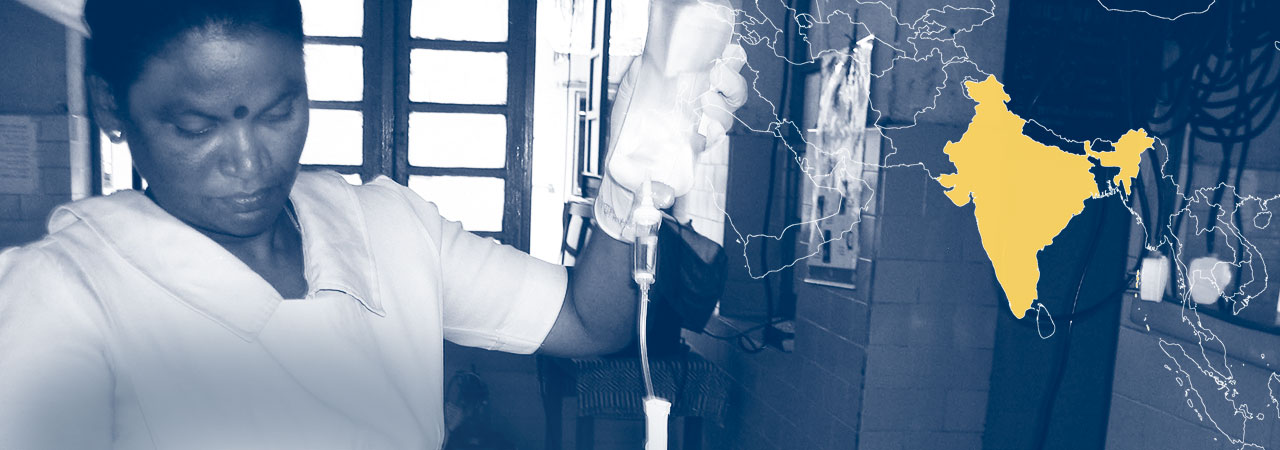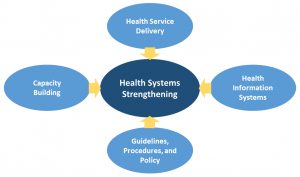I-TECH assists the Ministry of Health and Social Services with the expansion and provision of voluntary medical male circumcision (VMMC) as an HIV prevention option. This support started in 2008 with the development of national guidelines and training materials, followed by national trainings of health care workers. In 2015, this support expanded to include direct service delivery in the Oshana and Zambezi regions, as well as Karas region from 2017 onward. Since 2016, I-TECH has also supported demand creation with a network of community-based mobilizers and recruiters using a human-centered design approach to actively engage communities and stakeholders to increase the number of men voluntarily electing medical circumcision. The program has performed over 36,000 VMMCs in Namibia.
I-TECH has trained physicians, nurses, and community counselors to ensure that adequate skills and experience are in place to deliver safe, high-quality male circumcision services.
I-TECH works to strengthen the quality of pediatric HIV care and treatment in Namibia through the development of a “model” pediatric HIV clinic and supporting decentralization of quality pediatric care to other facilities. In collaboration with the Ministry of Health and Social Services, I-TECH developed an innovative, structured, culturally-relevant intervention to help guide health care workers and caregivers of HIV-positive children through the process of disclosing a child’s HIV-positive status to the child.
An evaluation of the disclosure program showed that it increased health care worker and caregiver confidence and communication in pediatric disclosure, as well as demonstrating improved viral suppression, adherence, and HIV knowledge among pediatric patients. I-TECH clinicians have also worked at the site level to support the development, implementation, and monitoring of strategies to improve adolescent HIV services and transition of adolescents from pediatric to adult care.
In 2017, in collaboration with the Côte d’Ivoire Ministry of Health and Public Hygiene (MSHP), the National Public Health Reference Laboratory (LNSP), and a local accreditation organization, the Regional Center for Health Evaluation and Accreditation (CRESAC), I-TECH conducted a baseline assessment of laboratory services at 50 laboratories across Côte d’Ivoire.
The purpose of the joint assessment was to determine the laboratory’s capacity to provide HIV and clinical diagnostic services. More specifically, I-TECH aimed to determine the number of laboratorians and HIV counseling and testing staff trained and certified in HIV testing; the quality and timeliness of HIV and clinical diagnostic tests; and the status of each laboratory in order to prepare them for laboratory accreditation under the SLIPTA (WHO’s Stepwise Laboratory Improvement Process Towards Accreditation) scheme.
In 2017, Côte d’Ivoire’s National Public Health Reference Laboratory (LNSP) and I-TECH convened a series of strategic planning meetings with the objective of reviewing and updating the vision, mission, and objectives of the previous National Laboratory Strategic Plan. These meetings and collaboration with various partners resulted in a revised plan, the 2017-2022 National Laboratory Strategic Plan.
The five-year strategic plan was agreed upon by representatives from key ministry structures, donors, and other stakeholders with influence on the laboratory system. Their joint actions resulted in a common mission: “To provide a biological diagnosis of quality to the populations living in Côte d’Ivoire by using reliable tests, carried out according to national and international guidelines, in compliance with quality assurance procedures, biosafety procedures, biosecurity and bioethics.”
In accordance with the HIV Care Continuum, I-TECH supports direct HIV care and treatment service delivery as well as on-site clinical mentoring and technical assistance in 81 facilities in five regions of Namibia. I-TECH supports key evidence-based strategies such as provider-initiated HIV counseling and testing, eMTCT, and decentralization of ART services to the clinic.
In collaboration with the MoHSS, I-TECH is implementing “Treatment for All” guidelines (December 2016), an HIV care and treatment approach that initiates patients on lifelong antiretroviral therapy as soon as they test HIV-positive. I-TECH has developed an interactive education and counseling intervention, ARVs and Healthy Me, for health care workers to support HIV-positive patients in attaining good adherence and engagement in care.
To improve the quality of data for use in clinical decision-making, I-TECH actively participates in national technical working groups and advisory committees, and conducts rigorous monitoring and evaluation (M&E) to build awareness and buy-in for data quality and date use among site-level managers and health care workers.
I-TECH began its work in Tanzania in 2006 at the request of the Ministry of Health and Social Welfare (MOHSW) and the U.S. Centers for Disease Control and Prevention (CDC). For over a decade, I-TECH has been providing national-level technical assistance to the National AIDS Control Program (NACP); National Tuberculosis and Leprosy Program (NTLP); Prevention and Mother to Child Transmission (PMTCT); Field Epidemiology and Laboratory Program (FELTP); Directorate of Human Resources for Development; Directorate for Nursing and Midwifery; and other departments in the Ministry of Health, Community Development, Gender, Elderly and Children, so as to strengthen health systems in Tanzania and improve the quality of care provided to patients with HIV/AIDS.
I-TECH Tanzania is directly contributing to the UNAIDS 95-95-95 targets through support for implementation of “Treat All” through differentiated HIV service delivery models (SDMs); strengthening of human resources for health and workforce capacity aligned to PEPFAR’s Human Resource for Health Strategy; policy development support; and public health surveillance through strengthening data collection, quality and interpretation at every level of the health system.
Program Highlights
I-TECH has worked for almost twenty years to support health systems strengthening and the national response to the HIV epidemic in Malawi through significant contributions to the development of a robust health care workforce that provides high-quality HIV prevention, care, and treatment services.
In Malawi, I-TECH works through the secondment of well-qualified, experienced technical advisors (TAs) in the Ministry of Health (MOH) and other institutions to provide technical assistance for development and implementation of the national strategic plan led by the Government of Malawi (GOM). I-TECH TAs play an important role in ensuring timely national HIV/TB response by supporting prevention and control across the HIV care continuum. Additionally, I-TECH TAs support and facilitate surveillance and M&E for HIV/TB programs. This assistance enables the MOH to collect and manage up-to-date data to inform evidence-based decision-making by GOM and partners.
I-TECH technical assistance to Malawi MOH also covers the implementation of national surveillance systems to improve the generation of high-quality epidemiological data. Surveillance TAs work together with their GOM counterparts to improve storage and transportation conditions for lab samples, train staff in analysis of surveillance samples, and increase the functionality of surveillance systems to generate reliable and accurate data. The principal surveillance projects I-TECH TAs support in Malawi are Birth Defects Surveillance and HIV Recent Infection Surveillance. Most recently, I-TECH TAs have been placed at Public Health Institute of Malawi (PHIM) to support GOM with its emergency response to the COVID-19 pandemic.
Departments and units supported by I-TECH TAs include the National Tuberculosis Control Programme, Department of HIV and AIDS, Supply Chain of HIV Commodities, Monitoring and Evaluation of HIV Program Diagnostics, Reproductive Health Department, PHIM, National HIV Reference Laboratory, and the National Registration Bureau. I-TECH TAs also support clinical mentoring and M&E at Lighthouse Trust, a Center of Excellence for HIV care that was established in 2001.
Program Highlights
Since 2005, I-TECH has drawn on expertise from the University of Washington and the University of California, San Francisco, to support the Ministry of Health (MOH) in advancing priorities in the areas of health information systems (HIS), HIS leadership and governance, Global Health Security (GHSA), and evidence-based Infection Prevention and Control (IPC) practices.
I-TECH Kenya’s programs aim to improve the quality of patient care and enable health care facilities to meet their health information, data collection, and reporting needs. I-TECH Kenya’s GHSA funded programs aim to advance the Global Health Security Agenda through strengthening information systems and reporting, and improving IPC in health care facilities.
In all efforts, I-TECH Kenya works closely with the MOH and local partners to develop and implement programs that can be successfully transitioned to local ownership, ensuring sustainable progress toward Kenya’s long-term health goals.
Program Highlights
Since 2003, I-TECH has been providing technical support and capacity building with health ministries and local organizations in the Caribbean Region to respond to the local HIV epidemic. Technical assistance has focused on continuous quality improvement, clinical mentoring of physicians and nurses, health systems strengthening, e-learning, and instructional design. Currently, the team is doing pioneering work to improve provider-patient communication with key populations affected by HIV in the region—gay and bisexual men, other men who have sex with men, transgender people, and sex workers.
In 2020, I-TECH launched the Caribbean Training and Education Center for Health (C-TECH), an independent, locally registered organization. C-TECH and I-TECH work in close partnership to support activities to improve retention in care, interruption in treatment, and viral suppression and to reduce loss to follow-up in HIV care and treatment programs. Together, the partners implement programs to strengthen access and quality of care for all people living with HIV, with an emphasis on key population groups that bear a disproportionate burden of HIV infection.
I-TECH currently works in Jamaica, Trinidad and Tobago, and Suriname and has worked in many other Caribbean countries in the past including Barbados, the Bahamas, Belize, Guyana, St. Lucia, St. Vincent and the Grenadines, St. Kitts and Nevis, Antigua and Barbuda, Grenada and Dominica.
Program Highlights





